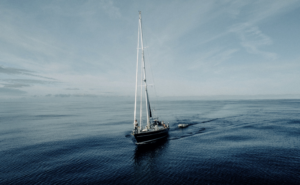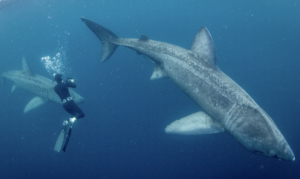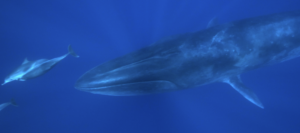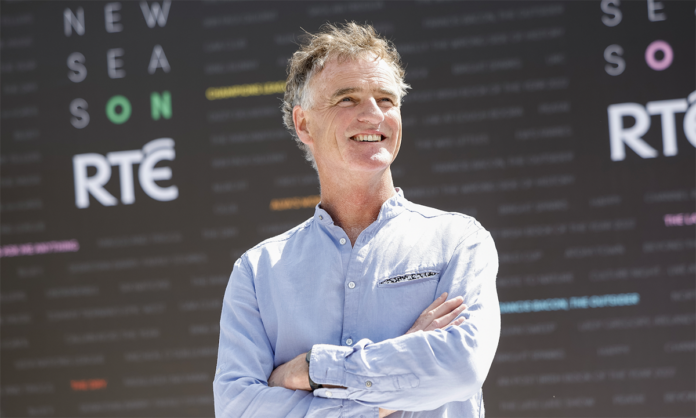STUNNING scenes from deep under the waters off the Clare coast, captured by a Lahinch-based film-maker, will be showcased on RTÉ next year.
As part of the national broadcaster’s new season, ‘North Atlantic’ will air early in 2023, providing what RTÉ described as “a reflective, insightful narrative … featuring blue-chip natural history scenes bringing the viewer into the actual moment of discovery of marine creatures”. The three-episode series follows Ken O’Sullivan’s highly-acclaimed, ‘Ireland’s Deep Atlantic’, which aired in 2018.

The new work, which has been in production for two-and-a-half years features scenes captured during the height of the pandemic when coastal areas were almost empty. “Our funding came through a week before the first lockdown,” Ken told The Champion.
“We were listed as essential workers, but were very careful not to stick to the guidelines and to avoid going in among people in small coastal communities. I shot a lot of footage on my own in my kayak. There was amazing stuff with sharks in places that would normally be full of tourists.”

More material was shot with a small crew of four, while scenes were also captured from aboard the national research vessel, The Celtic Explorer.
“We travelled up and down the North East Atlantic, following whales and sharks and trying to understand their activities,” Ken explained. “We had to follow fish stocks. To be honest, we found trouble there and a lot of stories that need to be told, but we found wonderful stories too.”
The final stages of post-production are now underway. Much of the work is being done at the Sea Fever Productions base in Lahinch. Next week, an original score, which Ken said had moved him to tears, will be recorded by the RTÉ Concert Orchestra.
Ken has been an underwater camera operator for more than a decade and a half and his family roots stretch into the history of Fenit Island in Kerry. His affinity for marine life and passion for conservation led to the creation of Junior Cycle learning resource based on ‘Ireland’s Deep Atlantic’.
The collaboration with the BAI, RTÉ and The Junior Cycle for Teachers (JCT) explores the learning of the series and is based on the principles of Education for Sustainable Development (ESD). “I was delighted to be able to do it,” he said. “That has been one of my proudest moments.”
Getting out to follow fin whales and basking sharks, once again, was clearly a labour of love for Ken, who runs Sea Fever Productions. “A fin whale is the second largest animal on the planet,” Ken said. “They could be up to 24 metres long and 80 tonnes in weight and we captured footage of those off the south coast. The basking shark is second largest fish in the ocean, but very little is known about them. We see them off the coast and then they disappear for eight months of the year. On the Celtic Explorer, which was offered to us for the project, and which could be out for voyages of between five days and three weeks, we went out searching for sharks and we got some amazing shots.”

Access to the Celtic Explorer came courtesy of The Marine Institute at Rinville, County Galway, who are among the funders of the new series. “We did have a good budget this time and we’re very grateful for the funding support,” Ken said.
“It’s not easy to fund a project and many of the funding schemes very competitive. Without something like the TV licence fee, which supports the Sound and Vision Fund, we wouldn’t have been able to make this series. As well as The Marine Institute and The Broadcasting Authority of Ireland (BAI), we were funded by the Environmental Protection Agency (EPA), RTÉ and the Department of the Marine.”
With post production for ‘North Atlantic’ well underway, Ken admitted that being cooped up in an editing suite is not his favour part of the process. “I am pretty hands on with the edit and we have a great editor, Mary Crumlish,” he said.
“There’s a lot of time spend indoors, but I’m blessed that I’m able to get out to swim every day, that keeps me sane. The fun part of the work is always being out at sea. That can be ferociously hard, too, at times, because you can spend days without finding anything.”
There have been some highlights in the editing process, not least the prospect of an original soundtrack, created by 23-year-old Bradley Ayres. “That has been just a dream,” Ken said.
“Bradley is an absolute genius. He wrote the score based on rough assemblies and the RTÉ Concert Orchestra will record it. Music really drives the pace of the piece and I actually cried listening to it.”


